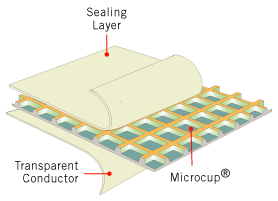
The SiPix Microcup® is a microscale container which holds minute quantities of materials such as dielectric fluid and charged particles that are used in e-paper display. Large arrays of Microcups® are fabricated through roll-to-roll© manufacturing processes which enable economy and scale. The material is flexible, is easily cut to size, and enables many custom applications such as e-paper.
The Microcup® structure is typically 150 μm thin and is significantly resistant to impact and pressure due to its architecture of supporting walls. It is built upon a layer of flexible PET plastic, which may include a transparent conductor such as Indium Tin Oxide (ITO). The contents of the Microcup® are hermetically sealed to protect them from the environment.
The SiPix Microcup is manufactured using a high-speed roll-to-roll© embossing process (see diagram below). A continuous sheet of PET plastic, coated with a transparent conductor such as ITO, is fed through a coater which evenly distributes a proprietary resin across the surface. A microembosser then molds the three-dimensional structure of the Microcup® onto the resin. At this point, the Microcups® are filled with the desired materials and hermetically capped with a sealing layer. A removable layer then is applied to protect the Microcup® film until it may be attached to the backplane.

© SiPix. All Rights Reserved
Fabrication of e-paper
SiPix e-paper is created by inserting electrically-charged white particles and dielectric fluid within the Microcup® during roll-to-roll© manufacturing. Once the e-paper is laminated to a patterned conductor with adhesive (see illustration below), the e-paper display may be driven. Note that the visible side is the bottom layer of the Microcup® manufacturing process.
Optical PrinciplesUnder the influence of an applied electric field, the charged particles migrate through the dielectric fluid. If the white particles are at the visible surface, that area of the display reflects a white color to the viewer. Otherwise, the display will reflect the alternate color, which presently is either black, red, green blue, or gold. Grayscale may be produced by modulating the electric field across the Microcup® film.
Both monochrome and area color displays may be produced with SiPix e-Paper. The viewing angle is approximately 180°. SiPix e-paper has image memory - the display content remains after the power has been removed. Due to this benefit, extremely low-power portable devices may be created.See SiPix FAQ for more details.
(via www.sipix.com)




